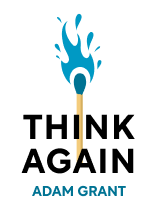

This article is an excerpt from the Shortform book guide to "Think Again" by Adam Grant. Shortform has the world's best summaries and analyses of books you should be reading.
Like this article? Sign up for a free trial here.
What are the dangers of overconfidence? How does overconfidence hamper critical thinking?
When you’re overconfident in your knowledge, you’re prone to closed-minded thinking in which you don’t question your views or critique your conclusions. By continuously confirming your viewpoints, you reinforce your way of thinking as “right” and become blind to the perspectives of others.
Here’s how overconfidence breeds closed-mindedness, according to Adam Grant.
The Overconfidence Cycle
According to Adam Grant, the author of Think Again: The Power of Knowing What You Don’t Know, outwardly defensive behaviors often coincide with an inward thought process that reinforces your beliefs and closes you off to reconsideration. Grant calls this process by the term Overconfidence Cycle and it operates in the following sequence:
The Conviction-Assumption Process will almost always prove you right—Being unaware of other points of view results in a false sense of certainty regarding the validity of your opinions and causes you to become overconfident in your decision-making.
(Shortform note: Grant sees the Conviction-Assumption Cycle as a result of unfounded certainty in your beliefs, but this cycle can also occur when you feel insecure in your beliefs and become defensive about them as a result. A recent psychological study showed that people are prone to engage in defensive behaviors when they believe their competence is being questioned.)
Bridge the Gap Between Assumption and Reconsideration
Grant says that the first step in avoiding closed-mindedness is knowing that you need to reconsider your views and being able to admit when you’re wrong.
To develop your ability to admit when you’re wrong, Grant says that you must first detach your identity from your beliefs and opinions. He shares two suggestions for this:
Suggestion #1: Differentiate Your Current Self From Your Past Self. Detach yourself from your old beliefs by reflecting on who you used to be and how you have changed. Explore this concept by drawing a Venn diagram that shows the beliefs and values of your past self and how they compare with your beliefs and values today.
Suggestion #2: Identify With Your Morals, Not Your Opinions. Morals and values are your core principles (for example, generosity, kindness, or creativity). Grant asserts that morals and values provide a broader and more flexible framework for your identity than beliefs because you can apply them consistently across a broad range of situations. A belief, on the other hand, is usually far more narrow and specific, and it is less able to adapt to new evidence.
For example, a teacher believes that assigning homework is beneficial and feels threatened by recent evidence suggesting that homework provides few benefits. But when the teacher identifies creativity as a core value, she considers if there are more creative, effective ways to reinforce her lessons. She becomes open to adapting and experimenting with new methods that work best for her students—instead of being restricted to her old ways by her narrow belief.
The Reconsideration Process
When you disconnect your beliefs from your identity, you begin to see your beliefs and opinions as untested hypotheses rather than absolute truth.
This allows you to engage in a healthier way of thinking: the Reconsideration Process (Grant calls this the Rethinking Cycle). Grant contrasts this process to the Conviction-Assumption Process—you approach your beliefs with curiosity rather than certainty, and you investigate what you don’t know instead of clinging tightly to old beliefs and becoming defensive. You express humility and doubt about the topic, ask questions, and gain knowledge.

———End of Preview———
Like what you just read? Read the rest of the world's best book summary and analysis of Adam Grant's "Think Again" at Shortform.
Here's what you'll find in our full Think Again summary:
- Why the ability to reconsider is more important than precise knowledge
- How knowledge and expertise can narrow your thinking and limit your potential
- How to improve your ability to reconsider things in work and in life






